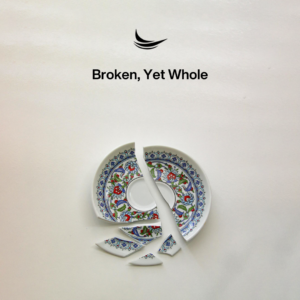Broken, Yet Whole
 If your life can be best described as “a mess” and you feel like your sense of self is shattered, there is hope. It is tough to see a glimmer of light when situations feel pervasive. When you are in the middle of a mess, it can also be difficult to have perspective. If you struggle with feeling broken, these words of encouragement are for you.
If your life can be best described as “a mess” and you feel like your sense of self is shattered, there is hope. It is tough to see a glimmer of light when situations feel pervasive. When you are in the middle of a mess, it can also be difficult to have perspective. If you struggle with feeling broken, these words of encouragement are for you.
Some of the most beautiful pieces of art are crafted from broken pieces. I love the unique character and beauty of mosaics and art that uses broken and recycled materials. Individual pieces of broken pieces can be crafted into exquisite art, highlighted by their bindings.
Kintsugi is the Japanese art of repairing broken pottery with golden joinery, consisting of lacquer mixed with powdered gold, silver, or platinum. Rather than taking broken pieces and throwing them away in the trash, broken pieces are transformed into whole objects that are viewed as more valuable. The finished vessels were seen as useful and being put on display.
Individuals who struggle with self-worth and events that shatter their sense of self such as child sexual abuse and complex post-traumatic stress disorder (PTSD) may feel seen and unheard. Everyone deserves to feel seen and heard. You can radiate beauty from the inside out. You are not damaged goods. You are not meant hidden away or discarded.
Here are words of wisdom for those who feel broken:
Trying to fix broken things by yourself when you are not equipped with the right tools can create a bigger mess.
You need support from others who can help share their tools and assist you with the repair process. A therapist is a great resource.
It can be vulnerable to invite others in, especially for those who have difficulty asking for help.
Take small incremental steps by inviting at least one person into your circle of trust. Therapy is a safe place with trained mental health providers who can assist you throughout each step of the way. Your therapist can help build a foundation of trust, starting within the therapeutic relationship.
Transformation takes time. It is a process, with important foundation steps. In therapy, this includes creating a strong therapeutic alliance to help serve as the “binding” to help hold the pieces together. You will become stronger as you practice applying the things learned in and outside therapy.
Binding holds the pieces together. We were not meant to pick up the pieces alone. There is power in building community. Family, friends, local community, spiritual and faith-based resources, online communities, national supports, and even the global community can help hold you. We are all interconnected. There are people available to help.
Embrace your imperfections. We can’t change the past, but we can learn from it and work towards acceptance. When focused on flaws, it can be tough to appreciate the strength and beauty. For example, do you focus on the imperfections when you think about your body? When looking for these, they will be apparent. Could both be true that you are imperfect, yet perfect? Embracing imperfection can bring a profound sense of freedom.
Some of the most beautiful works of art are crafted from broken pieces. I’ll leave you with a quote from Ernest Hemingway: “The world breaks everyone, and afterward some are strong at the broken places”. Healing is possible. While some people may not feel broken, they may also not feel whole. Sorting through the pieces of your life and working towards repairing the broken places is the first step towards creating a stronger whole.
Written By: Charlotte Johnson, MA, LPCC



























